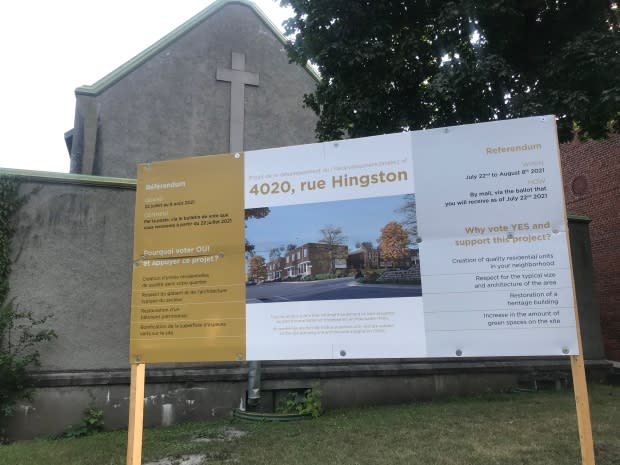Residents vote to replace century-old NDG church with high-end development

The 101-year old story of a vacant building in Montreal's west end is finally coming to an end after a referendum failed to halt demolition of the long-neglected St-Columba Church.
St-Columba Anglican Church will be replaced by 10 townhouses.
With its drab grey walls and crumbling concrete, the tiny church, built in 1920, doesn't quite match the ancient, high-steepled houses of worship found throughout the city.
Yet neighbours fought hard to preserve it five years ago, shutting down plans to redevelop the property into a row of single-family homes at the corner of Notre-Dame-de-Grâce and Hingston avenues.
Back in the spring of 2016, when enough residents signed a registry calling for a referendum, the Côte-Des-Neiges—NDG borough council withdrew the project rather than move forward with a costly voting process.
This time around, the borough's mayor, Sue Montgomery, pushed forward with the referendum.
"I am proud to say that we moved towards letting the residents decide for themselves, although facing political opposition from councillors Peter McQueen and Magda Popeanu from Projet Montréal," she said in a statement.
"We need local leadership from our elected officials, but also from our residents."
60% vote in favour of project
There were 556 ballots counted, representing a participation rate of 37 per cent, the borough said. A total of 337 people — roughly 60 per cent — voted in favour.
Independent Coun. Christian Arseneault, who represents the Loyola district, is among those against the church's redevelopment as proposed.
"This was the last hurdle to clear and the people have spoken," he said, but he would have liked to see the property used by the community or for social housing.
As interest in religion wanes and churches are put on the market, developers are quick to scoop them up with hopes of convincing council to approve a zoning change, Arseneault said.

These properties are cheap under institutional zoning, but skyrocket in value once they are zoned residential, he said.
Municipal governments don't have the resources or power to take over these properties and integrate them into the community or turn them into social or affordable housing, Arseneault said.
"There's a lot that could have been done, but of course the promoters went for luxury townhouses," he said. "We could have had a better project."
'No value in that building,' says resident
The developers, Alain Côté and Christian Guay, could not be reached for comment Monday. McQueen, the councillor who represents the district, was unavailable for comment.
Ian Walter, who lives near the church, said it's about time something be done about a building that has fallen into disrepair.
"You're much better off tearing it down. There was no value in that building, historical or otherwise," said Walter. "If nobody can put it to some good use, what's the point in having it?"
Now that the project is finally moving forward, Montgomery, the borough mayor, is thanking residents for coming out to vote and "exercising their rights as citizens," she said.

